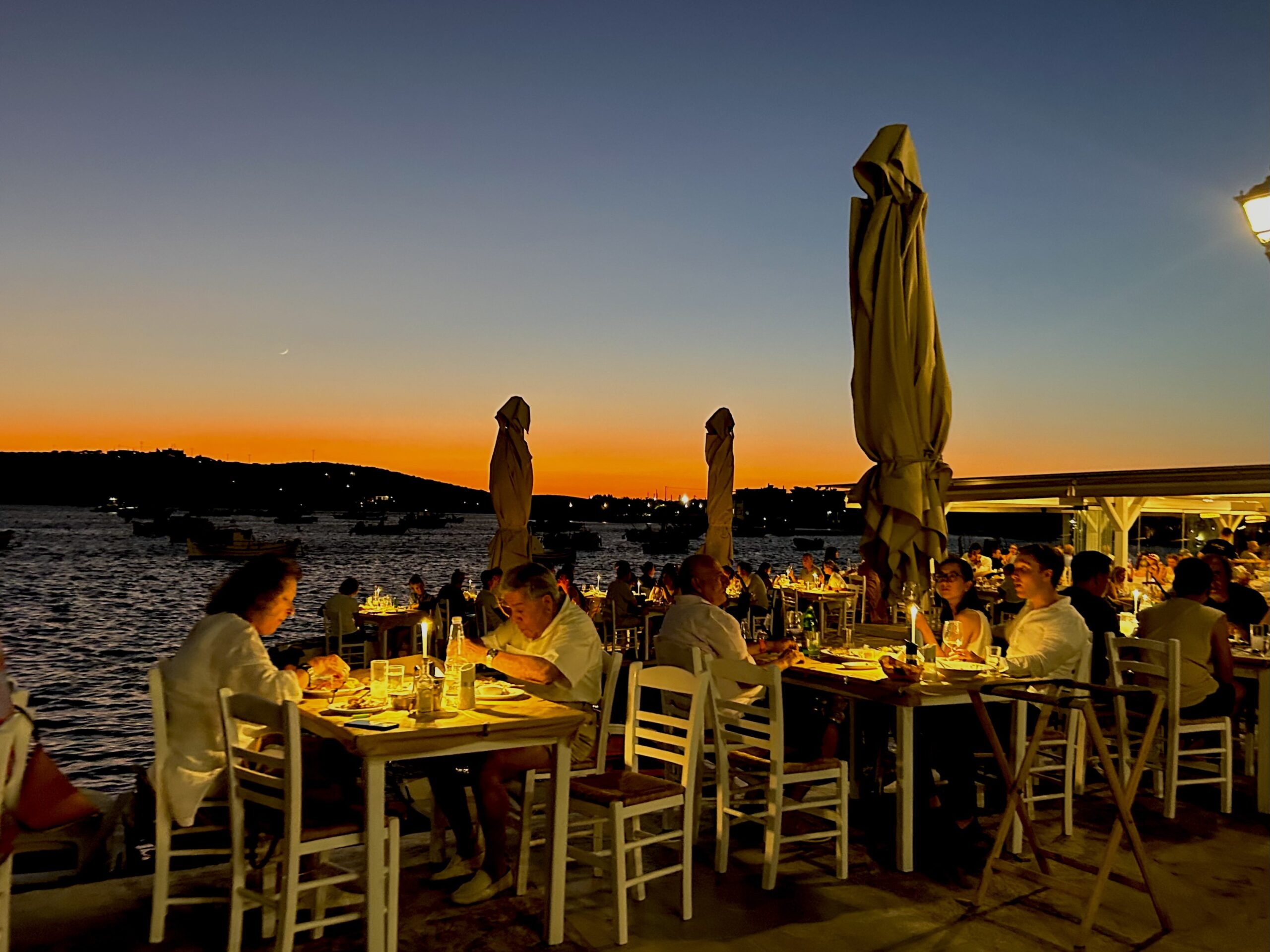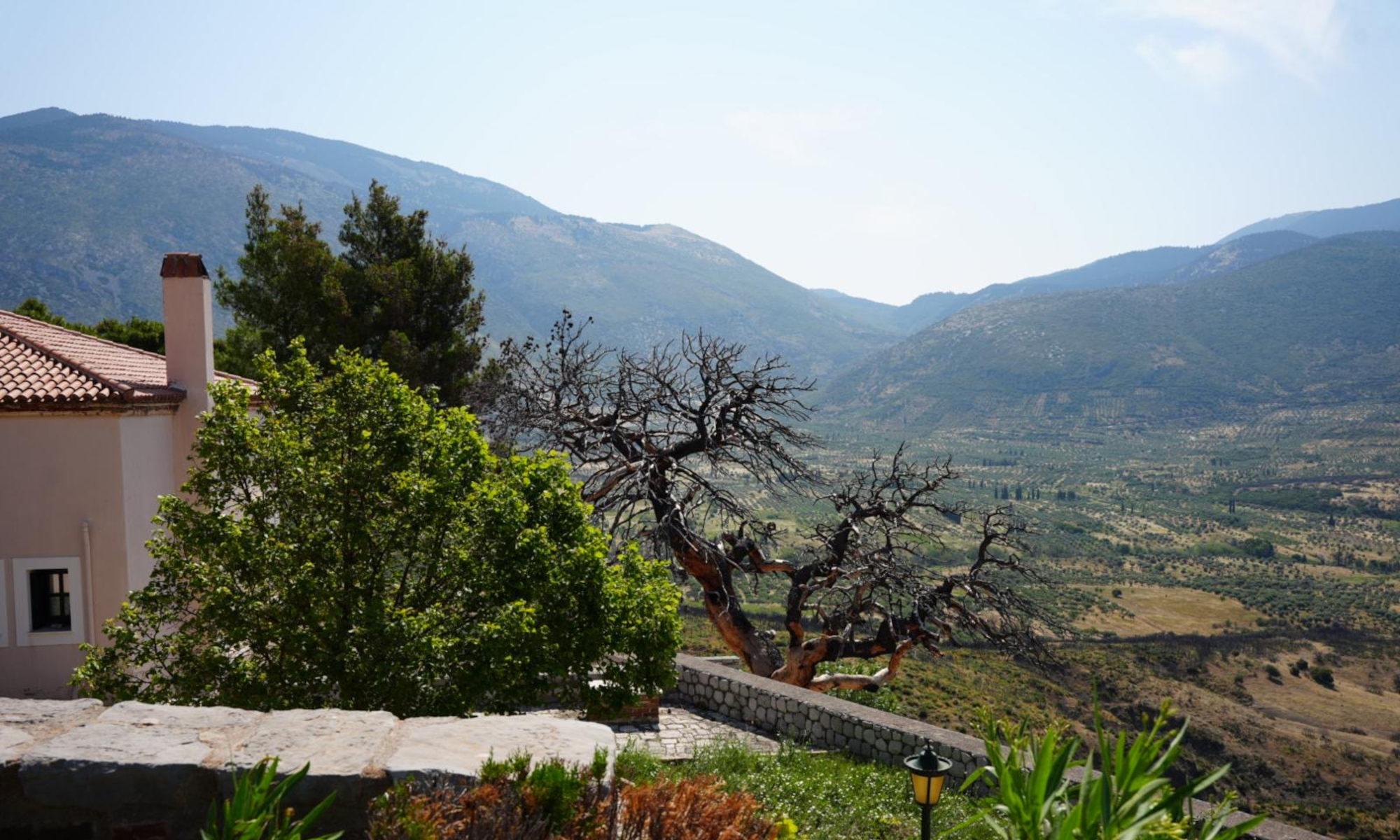On a Cycladic island reimagined for profit, a realtor tries to preserve what made it livable.
By Valerio Castellini

People don’t have the same patience that they used to have. Then everything has to happen fast, and we change ourselves as people.
Sophia Katsipi sits behind a glass desk in her real estate agency in Parikia, the capital of Paros. The sun-bleached white walls of the office make it bright, faithful to the muted geometries of Cycladic architecture. “I renovated this myself,” she says. “This is my kind of input. I’d like to see more buildings like this.” A simple rectangular plan, minimalistic interior, and small, wooden windows. A style that has evolved over the centuries, as a result of the climatic demands of the islands. Sipping on an espresso while her white poodle circles the chairs, she mused about the island’s future.
“People from France, Switzerland, Belgium, northern Italy—they came here for the culture. They maintained the look of the island, they appreciated the traditional buildings,” she explains. “They passed on that same kind of culture to the next generation.” These visitors often stayed for months, eventually buying homes. Some relocated permanently. Most came in May or September, well before the streets of the island towns began to buckle under peak-season traffic.
But that was before Paros became an investment product. “The majority of investors, at the moment, look at the yielding,” said Katsipi. “They are not here to actually live on the island. They’re here to develop, sell, go—or redevelop, go again. They don’t really care about the effect on the island.”
Today, a wave of short-term investors, often with no plans to live on the island, are reshaping the market. Their priority is yield: building large, eye-catching villas—preferably with pools—to flip for profit or monetise through high-end rentals.
“Paros is like a mini market,” she says. “We don’t have a brand name. I’m not sure what type of tourism we want.”
This shift has profound implications—not only for what is being built, but for whom Greece is attracting. “I don’t think culture has any connection with money,” she adds.
At the center of this transformation is a paradox. The more Greece tries to grow its tourism economy, the more it risks losing the very attributes that once made it attractive: affordability, authenticity, and embeddedness. What’s vanishing is not only traditional architecture or artisanal pottery, but a form of tourism that was socially and economically symbiotic. What Katsipi calls “cultured tourism” is being priced out—by policy decisions as much as by property sales.
“People don’t have the same patience that they used to have. Then everything has to happen fast, and we change ourselves as people,” Sophia explains, building on years of observing clients go through her office. “The majority today comes as investors, they look at the yielding.”
The reasons for this shift are multiple. With national and regional authorities slow to regulate construction and incapable of consistent enforcement, island professionals have found themselves standing in for absent institutions.
In 2024, Greece received over 35.9 million international visitors—more than three times the country’s population. Total tourism spending reached €21.6 billion, making the sector one of the country’s most vital economic engines. But on the Cycladic frontlines, those tasked with translating demand into homes, stays, and space are increasingly unsure of what kind of tourism they are building toward.
“We try to educate,” Katsipi says. “You might have a person that comes and says, ‘I want to build a villa with five-meter windows,’” she explains. Architectural guidelines in Paros and surrounding islands restrict window widths to prevent oversized, floor‑to‑ceiling glazing that can disrupt the Cubic white forms of Cycladic architecture. However, often these rules are bent—small illegal acts that accumulate across the landscape, slowly eroding its visual rhythm. “Even if you manage illegally to do something like this […] when you look at the island afterwards, it will look like a suburb of Athens,” concludes Katsipi.
In the current building spree, local realtors are left to navigate the gaps. “If the architect says, ‘Don’t worry, we’ll fix it,’ who am I?” Katsipi asks. “This job is difficult. You are always in between too many people— lawyers, notaries, engineers. […] There’s only so much we can do.”
Still, many try. Katsipi helped co-found the island’s Realtors Association to promote ethical practices and defend against what she calls the “illogical logic” of state policy. In an industry where “my word is my signature” used to suffice, she now insists on contracts, disclosure, and transparency. “A business that’s not only for today, but for long-lasting, is based on ethics,” emphasises Katsipi.
Nowhere is the state’s contradiction more visible than in its approach to swimming pools. In Paros, private pools are banned outside town settlements—nominally to preserve water. Yet they remain legal within towns, where density is higher and infrastructure often weaker.
“It doesn’t make sense,” Katsipi says. “Outside town, in 8,000 square meters of land, you can build 280 square meters and have maybe three pools, max. But inside town, you can divide into 1,000-meter plots, build much more, and have four pools. It doesn’t make sense that it’s for water preservation.”
More broadly, this kind of prohibition, she argues, doesn’t reduce water use—it just fuels informal workarounds. Shallow “splash pools” are dug, then quietly deepened once the final checks have been conducted at the end of the construction process. Engineers are asked to certify legality, or to look the other way. Buyers are told not to worry.
“It’s prohibition that doesn’t correspond to legality,” she says. “It just creates another wave of illegality.”
And who gets to build legally, with full amenities? Hotels. Large developments. The very entities most capable of negotiating exceptions. “What you’re creating is cartel tourism,” she says. “You take the pools away from the normal villas where people come to for […] a bit of peace and tranquillity.” Tourists that are just looking for relaxation, that do not cram the streets. “Hotels have the right to build 30 rooms, each room with a pool,” Katsipi explains, raising the contradiction.
The real matter is that the island needs to decide what they wish to receive. Elite tourism? Mass tourism? Something in between? It has become clear that it is not possible to do everything at once.
Beneath these debates lies a deeper one about social sustainability. The form of tourism now prevailing in places like Paros has grown beyond unbalanced. It has become extractive.
When wealthy investors flip homes for profit, the local economy doesn’t grow—it inflates. Teachers and nurses can’t find housing. Essential services workers commute from other islands. Meanwhile, those who do buy homes are increasingly absent. “There’s a class of buyers who don’t even want to be here in August,” Katsipi notes. “They come in May-June or September-October. The rest of the time, the house sits empty—or is on Airbnb.”
This is not development. It is simply exponential growth. The distinction matters. Growth adds numbers. Development builds systems. At the moment, Greece has a surplus of the former and a deficit of the latter.
For Katsipi and others, the future of tourism in Greece won’t be determined by one regulation or one real estate deal. It will depend on whether the country—and especially its islands—can resist the temptation to sell everything to everyone. It will require choosing, clearly and collectively, the kind of tourism that is worth sustaining.
“It’s okay to have diversity,” Katsipi says. “But we have to decide where we’re going.”
